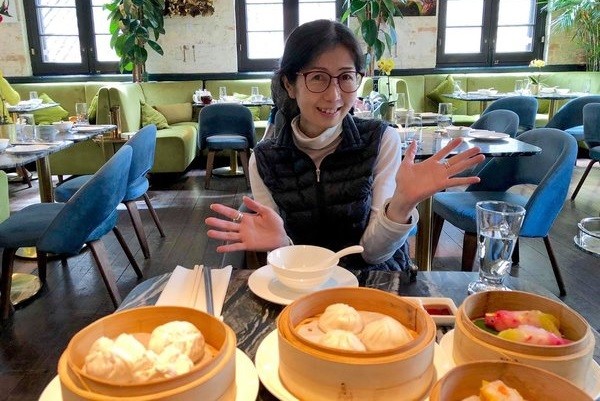Private Japanese Class Causeway Bay
Japanese Tutor SAKI

Causeway Bay Japanese Teacher SAKI
Japanese Teaching Experience 6 Years
Native Language Japanese
Language Ability Fluent in English and Fluent in Cantonese
Born KAGAWA – Japan
Teaching Area Causeway Bay, Wanchai, Central, Mid level, Admiralty, Sheung WAN etc
Japanese Courses Provided by SAKI
Private Japanese Class Causeway Bay
I am Saki as a native Japanese tutor. First, let me introduce myself. I came from west Japan area. I like eating and music very much. I was a coordinator, I also was a tour guide and tour escort before, singing a song at live house and voicesover sometimes.
I would like to teach you more useful travel Japanese, Standard clear pronunciation And how to sing a Japanese songs, Like a animations songs, old pop songs, J-rock etc.. Please let me know what you want learn for and your targets. I will try to more best way for you. Hope to see you soon!
私は、日本語教師のSakiと申します。まずは、自己紹介をさせてくださいね。私は西日本からまいりました。食べることと音楽が大好きです。通常は、様々なコーディネーターをやっていますが、以前は、旅行のガイド添乗員などもやっていました。そして、時々、声を使う仕事やライブハウスで歌を歌ったりしています。
私は皆さんにぜひ、旅行で使える日本語会話や日本語のきれいな発音、そして、日本語の歌が歌いたい人のために、アニソンや、昔なつかしい歌、J-rockなどの歌い方などをぜひ、教えたいと思います。皆さんが、どういったことを習いたいかなどや、目標をぜひ、教えていただいて、できるだけそれが達成できるように一緒に頑張りたいと思います。では、皆さんにお会いできるのを楽しみにしております。
Why did you start Japanese private class?
Many Asians love Japan and Japanese cultural including Hong Kong people, as a native Japanese living in Hong Kong, I wish I could help more Japanese lovers to learn to speak Japanese, when they travel to Japan next time, they could speak more Japanese with the local people. I also love anime and Japan drama, I wish I could help more Japanese learners enjoy more Japanese entertainments, say J-pop, Anime songs, I wish the students could sing in Japanese like native sounds.
香港の人を含めたアジアの方々って本当に日本や日本の文化が好きな人がたくさんいて、そんな日本が好きな方々で日本語を上手になりたいとか、次回の日本の旅行とかで使ってみたいという人のお手伝いができればうれしいなと思ったからです。例えば、アニメや日本語のドラマが私も大好きで、そういう方々にも、日本語を学んでもっと楽しく見ていただきたい、J-popや、アニソンも大好きなので、そういうかたにも、原曲に近い発音で楽しく歌っていただければとうれしいです。
What do you think the most difficult part of learning Japanese for Hong Kong students? And how did you help Hong Kong students to learn Japanese better?
I think the difficult part for Hong Kong students to learn Japanese is KEIGO and TEINEI GO (say in polite expressions in Japanese), which is showing your consideration and respect for a person older than you, with a different position or experience in a company. Native Japanese speech will differ accordingly to the person in front of you: a friend, a colleague, a chief or a client; and to whom you a referring to: yourself, your friend, colleague or client.
My personal Japanese lesson, I will focus on more and more oral speaking for KEIGO and TEINEIGO, to help the students get used to it.
目上のかたに敬語や丁寧語などを使うみたいな それぞれの人に対しての言い方や単語などが違うところが難しいかなと思います。
これは、できるだけたくさん会話の練習をして、慣れてしまえば大丈夫だと思いますよ。
Ask SAKI Teacher Japanese Culture Questions
Giving Gifts in Japan
Gift giving is a common part of Japanese culture. Visiting a company for business purpose or visiting the relatives, usually the Japanese people bring the gifts, when giving the gifts, the Japanese people usually say “Here’s a little or boring stuff for you, I hope this is helpful for you” or “Not sure if you like this tastes or not, please enjoy it” if the gifts are the food, passing the gifts to the receivers.
Why the Japanese people say “Here is a little or boring stuff for you” when giving the gifts? Because the Japanese people want to show their respects in front of the gifts receivers especially at the clients’ companies when passing the gifts to the clients.
If you say “Please receive my gifts” which may seem too confident, the Japanese people usually say “Here is a little or boring stuff for you” when giving the gifts, this is Japanese traditions from ancient Japan.
There are many kinds of souvenirs in Japan, but in consideration of the number of people visiting, the place and the environment, they are individually packaged so that it is easy to eat, and if the foodie persons, the Japanese people may buy some cakes from famous shops or choose the items that seems to be useful and is likely to be used, alcohol that is hard to buy, the Japanese people also think the taste of the persons etc., and usually choose the one that the receivers are likely to be happy. I think this is also the heart of Japanese hospitality. It’s fun to choose the gifts and looking forward to seeing the smiles of the gifts receivers.
Not only the formal visiting, but there is also the custom of handing casual souvenirs to neighbors and friends, so if you are giving the gifts to your close friends, you don’t have to say “it’s a little or boring stuff”. There are many kinds of souvenirs. Gifts are limited items in a specific place (can only be purchased at that store) and local items (are famous at that place and can only be purchased there) are also particularly popular gifts.
However, if there are too many gift souvenirs to choose from and you may get confused, please feel free to consult with the shop assistants and ask for the recommendation,you may tell the shop assistant the gifts receivers’ age, gender, relationship with you, preferences etc.
The shop assistants have more experiences with many customers, so they may help to choose the gifts for you, they know what the best seller is, what is more popular for the particular customers.
I hope all the people enjoy choosing the souvenirs.
おみやげ
日本には、”お土産(おみやげ)”を渡す習慣があります。
仕事で会社を訪問する時、親戚の家に行く時などとてもよいものでも”つまらないものですが”とか(例えば食べ物の場合なら)”お口に合うかどうかわかりませんが”と最初に謙虚の言葉を使って、(例えば食べ物の場合なら)お召しあがりください”(例えば物などの場合なら)お役にたてていただければ幸いです”と言って、両手で渡します。
“つまらないものですが”の意味は、「あなたを前にしてはつまらないものですが」という意味で使われる言葉で、訪問先で手土産を渡す場面や、プレゼントといった贈り物をするときに相手を敬って使用される表現です。
“どうぞ!うけとってください!”と自信満々に渡すよりも、自分の行動を謙遜しながら渡すのが日本人の風潮にあり「つまらないものですが・・・」という謙遜した表現は、古くから受け継がれている言葉です。
お土産は、たくさんの種類がありますが、訪問するところの人数や、環境などを考えて、食べやすく個装にしているお菓子や、グルメの方が多い場合は、有名なお店のケーキだったり、役に立てそうで、使ってもらえそうな雑貨だったり、なかなか買えないお酒だったり、相手の好みなども考えて、喜んでもらえそうなものを選びます。こういったところも日本のおもてなしの心だと思います。喜んでもらえる顏を浮かべながら、選ぶのも楽しいですね!
訪問のようなフォーマルだけでなく、カジュアルに、簡単なお土産を近所の方やお友達にも渡す習慣もあるので、(親しい仲なら、”つまらないものですが”、と言わなくて大丈夫です)お土産の種類が大変充実しています。限定品(そのお店でしか買えないもの)や ご当地(その場所の有名なものでそこでしか買えないもの)なども特に人気があります。
しかし、たくさんありすぎて、迷ってしまう場合は、お土産をあげたい人の内容を”こういう人にあげたいのですが(年齢や、性別、関係性、好みなど)オススメはどれですか?”
遠慮なくお店の人に相談してみてください。お店の人は常にたくさんのお客様と接しているため、今、どれが売れているか、どんなものが喜ばれるかをわかっているので一緒に選んでくれると思いますよ。
皆さんもぜひ、おみやげ選びを楽しんでみてください。



Stay in Touch
RSS
Facebook
Twitter
Google +1